One way you can solve this is by using a dictionary, using a composite key of a tuple and the matching value of a datatype bool.
Dictionary<Tuple<string, string>, bool>
The composite key Tuple<sring,string> will contain every permutation of participants and match them to their appropriate bool value.
For example, the dictionary filled with values such as:
Dictionary<Tuple<"Judith","James">, true>
...would be indicating that Judith picking James is valid.
So lets create a dictionary with every single possible combination of participants, and set the value of them to true for them being valid at the start of the program.
This can be accomplished by a cartesian join using an array with itself.
Dictionary<Tuple<string, string>, bool> dictionary = participants.SelectMany(left => participants, (left, right) => new Tuple<string, string>(left, right)).ToDictionary(item=> item, item=>true);
After getting every permutation of possible picks and setting them to true, we can go through the "not allowed to pick" lists and change the dictionary value for that composite key to false.
dictionary[new Tuple<string, string>(personNotAllowing, notAllowedPerson)] = false;
You can remove a participant from picking itself by using a loop in the following way:
for(int abc=0;abc<participants.Length;abc++)
{
//remove clone set
Tuple<string, string> clonePair = Tuple.Create(participants[abc], participants[abc]);
dictionary.Remove(clonePair);
}
Or by simply changing the value of the clone pair to false.
for(int abc=0;abc<participants.Length;abc++)
{
dictionary[Tuple.Create(participants[abc],participants[abc])] = false;
}
In this example program, I create a string[] of participants, and a string[] for the respective list of people they do not allow. I then perform a cartesian join, the participants array with itself. This leads to every permutation, with an initial true boolean value.
I change the dictionary where the participants are not allowed to false, and display the example dictionary.
Afterward, I create 10 instances of random participants who are picking other random participants and test if it would be valid.
Every time a participant picks another participant, I check that composite key to see if it has a value of true.
If it does result in a valid pick, then every combination of the resulting participant who was picked gets set to false.
for(int j=0; j<participants.Length;j++)
{
//Make the partner never be able to be picked again
Tuple<string, string> currentPair2 = Tuple.Create(partner, participants[j]);
try
{
dictionary[currentPair2] = false;
}
catch
{
}
}
This concept is better illustrated with running the code.
The demo:
static void Main(string[] args)
{
//Create participants set
string[] participants = {"James","John","Tyrone","Rebecca","Tiffany","Judith"};
//Create not allowed lists
string[] jamesNotAllowedList = {"Tiffany", "Tyrone"};
string[] johnNotAllowedList = {};
string[] tyroneNotAllowedList = {};
string[] rebeccaNotAllowedList ={"James", "Tiffany"};
string[] judithNotAllowedList = {};
//Create list of not allowed lists
string[][] notAllowedLists = { jamesNotAllowedList, johnNotAllowedList, tyroneNotAllowedList, rebeccaNotAllowedList, judithNotAllowedList};
//Create dictionary<Tuple<string,string>, bool> from participants array by using cartesian join on itself
Dictionary<Tuple<string, string>, bool> dictionary = participants.SelectMany(left => participants, (left, right) => new Tuple<string, string>(left, right)).ToDictionary(item=> item, item=>true);
//Loop through each person who owns a notAllowedList
for (int list = 0; list < notAllowedLists.Length; list++)
{
//Loop through each name on the not allowed list
for (int person = 0; person<notAllowedLists[list].Length; person++)
{
string personNotAllowing = participants[list];
string notAllowedPerson = notAllowedLists[list][person];
//Change the boolean value matched to the composite key
dictionary[new Tuple<string, string>(personNotAllowing, notAllowedPerson)] = false;
Console.WriteLine(personNotAllowing + " did not allow " + notAllowedPerson);
}
}
//Then since a participant cant pick itself
for(int abc=0;abc<participants.Length;abc++)
{
//remove clone set
Tuple<string, string> clonePair = Tuple.Create(participants[abc], participants[abc]);
dictionary.Remove(clonePair);
}
//Display whats going on with this Dictionary<Tuple<string,string>, bool>
Console.WriteLine("--------Allowed?--Dictionary------------\n");
Console.WriteLine(string.Join(" \n", dictionary));
Console.WriteLine("----------------------------------------\n\n");
//Create Random Object
Random rand = new Random();
//Now that the data is organized in a dictionary..
//..Let's have random participants pick random participants
//For this demonstration lets try it 10 times
for (int i=0;i<20;i++)
{
//Create a new random participant
int rNum = rand.Next(participants.Length);
string randomParticipant = participants[rNum];
//Random participant picks a random participant
string partner = participants[rand.Next(participants.Length)];
//Create composite key for the current pair
Tuple<string, string> currentPair = Tuple.Create(partner,randomParticipant);
//Check if it's a valid choice
try
{
if (dictionary[currentPair])
{
Console.WriteLine(randomParticipant + " tries to pick " + partner);
Console.WriteLine("Valid.\n");
//add to dictionary
for(int j=0; j<participants.Length;j++)
{
//Make the partner never be able to be picked again
Tuple<string, string> currentPair2 = Tuple.Create(partner, participants[j]);
try
{
dictionary[currentPair2] = false;
}
catch
{
}
}
}
else
{
Console.WriteLine(randomParticipant + " tries to pick " + partner);
Console.WriteLine(">>>>>>>>Invalid.\n");
}
}
catch
{
//otherwise exception happens because the random participant
//And its partner participant are the same person
//You can also handle the random participant picking itself differently
//In this catch block
//Make sure the loop continues as many times as necessary
//by acting like this instance never existed
i = i - 1;
}
}
Console.ReadLine();
}

